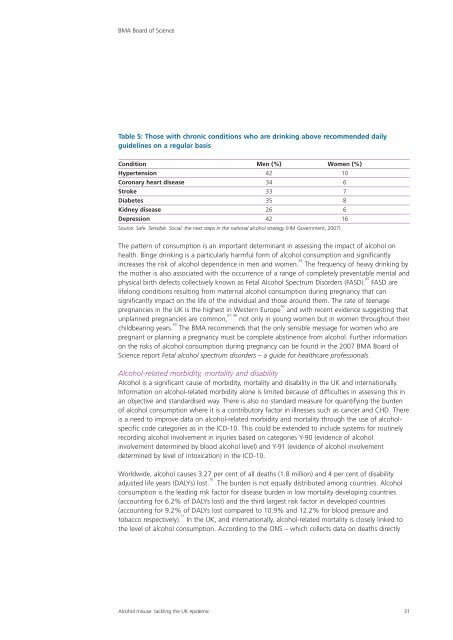Alcohol misuse: tackling the UK epidemic - London
Alcohol misuse: tackling the UK epidemic - London
Alcohol misuse: tackling the UK epidemic - London
Create successful ePaper yourself
Turn your PDF publications into a flip-book with our unique Google optimized e-Paper software.
BMA Board of Science<br />
Table 5: Those with chronic conditions who are drinking above recommended daily<br />
guidelines on a regular basis<br />
Condition Men (%) Women (%)<br />
Hypertension 42 10<br />
Coronary heart disease 34 6<br />
Stroke 33 7<br />
Diabetes 35 8<br />
Kidney disease 26 6<br />
Depression 42 16<br />
Source: Safe. Sensible. Social: <strong>the</strong> next steps in <strong>the</strong> national alcohol strategy (HM Government, 2007)<br />
The pattern of consumption is an important determinant in assessing <strong>the</strong> impact of alcohol on<br />
health. Binge drinking is a particularly harmful form of alcohol consumption and significantly<br />
increases <strong>the</strong> risk of alcohol dependence in men and women. 64<br />
The frequency of heavy drinking by<br />
<strong>the</strong> mo<strong>the</strong>r is also associated with <strong>the</strong> occurrence of a range of completely preventable mental and<br />
physical birth defects collectively known as Fetal <strong>Alcohol</strong> Spectrum Disorders (FASD). 65<br />
FASD are<br />
lifelong conditions resulting from maternal alcohol consumption during pregnancy that can<br />
significantly impact on <strong>the</strong> life of <strong>the</strong> individual and those around <strong>the</strong>m. The rate of teenage<br />
pregnancies in <strong>the</strong> <strong>UK</strong> is <strong>the</strong> highest in Western Europe 66<br />
and with recent evidence suggesting that<br />
67, 68<br />
unplanned pregnancies are common, not only in young women but in women throughout <strong>the</strong>ir<br />
childbearing years. 69<br />
The BMA recommends that <strong>the</strong> only sensible message for women who are<br />
pregnant or planning a pregnancy must be complete abstinence from alcohol. Fur<strong>the</strong>r information<br />
on <strong>the</strong> risks of alcohol consumption during pregnancy can be found in <strong>the</strong> 2007 BMA Board of<br />
Science report Fetal alcohol spectrum disorders – a guide for healthcare professionals.<br />
<strong>Alcohol</strong>-related morbidity, mortality and disability<br />
<strong>Alcohol</strong> is a significant cause of morbidity, mortality and disability in <strong>the</strong> <strong>UK</strong> and internationally.<br />
Information on alcohol-related morbidity alone is limited because of difficulties in assessing this in<br />
an objective and standardised way. There is also no standard measure for quantifying <strong>the</strong> burden<br />
of alcohol consumption where it is a contributory factor in illnesses such as cancer and CHD. There<br />
is a need to improve data on alcohol-related morbidity and mortality through <strong>the</strong> use of alcoholspecific<br />
code categories as in <strong>the</strong> ICD-10. This could be extended to include systems for routinely<br />
recording alcohol involvement in injuries based on categories Y-90 (evidence of alcohol<br />
involvement determined by blood alcohol level) and Y-91 (evidence of alcohol involvement<br />
determined by level of intoxication) in <strong>the</strong> ICD-10.<br />
Worldwide, alcohol causes 3.27 per cent of all deaths (1.8 million) and 4 per cent of disability<br />
adjusted life years (DALYs) lost. 70<br />
The burden is not equally distributed among countries. <strong>Alcohol</strong><br />
consumption is <strong>the</strong> leading risk factor for disease burden in low mortality developing countries<br />
(accounting for 6.2% of DALYs lost) and <strong>the</strong> third largest risk factor in developed countries<br />
(accounting for 9.2% of DALYs lost compared to 10.9% and 12.2% for blood pressure and<br />
tobacco respectively). 71<br />
In <strong>the</strong> <strong>UK</strong>, and internationally, alcohol-related mortality is closely linked to<br />
<strong>the</strong> level of alcohol consumption. According to <strong>the</strong> ONS – which collects data on deaths directly<br />
<strong>Alcohol</strong> <strong>misuse</strong>: <strong>tackling</strong> <strong>the</strong> <strong>UK</strong> <strong>epidemic</strong> 31
















